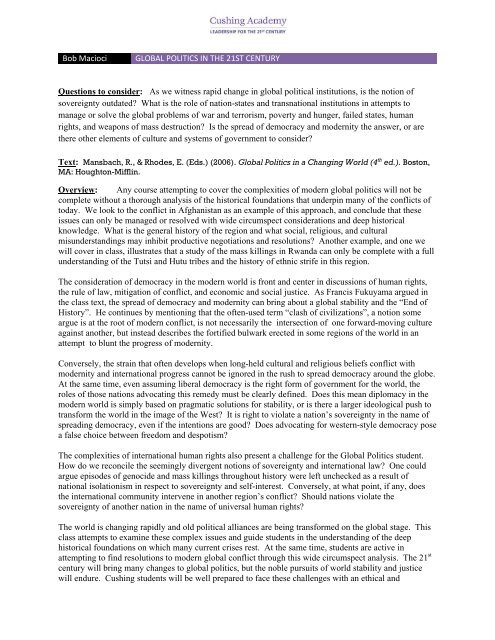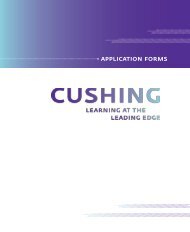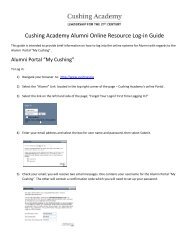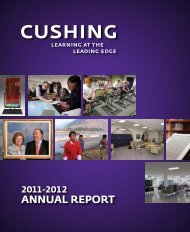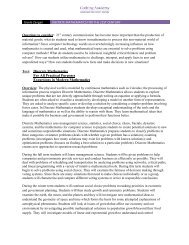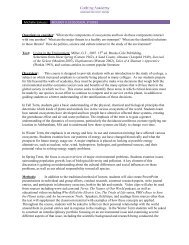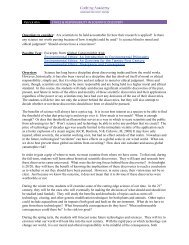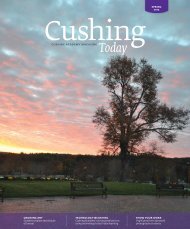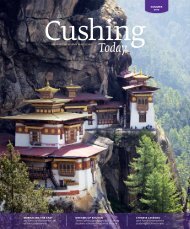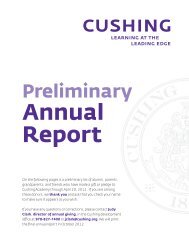Bob Macioci GLOBAL POLITICS IN THE 21ST CENTURY Questions ...
Bob Macioci GLOBAL POLITICS IN THE 21ST CENTURY Questions ...
Bob Macioci GLOBAL POLITICS IN THE 21ST CENTURY Questions ...
You also want an ePaper? Increase the reach of your titles
YUMPU automatically turns print PDFs into web optimized ePapers that Google loves.
<strong>Bob</strong> <strong>Macioci</strong><br />
<strong>GLOBAL</strong> <strong>POLITICS</strong> <strong>IN</strong> <strong>THE</strong> <strong>21ST</strong> <strong>CENTURY</strong><br />
<strong>Questions</strong> to consider: As we witness rapid change in global political institutions, is the notion of<br />
sovereignty outdated What is the role of nation-states and transnational institutions in attempts to<br />
manage or solve the global problems of war and terrorism, poverty and hunger, failed states, human<br />
rights, and weapons of mass destruction Is the spread of democracy and modernity the answer, or are<br />
there other elements of culture and systems of government to consider<br />
Text: Mansbach, R., & Rhodes, E. (Eds.) (2006). Global Politics in a Changing World (4 th ed.). Boston,<br />
MA: Houghton-Mifflin.<br />
Overview: Any course attempting to cover the complexities of modern global politics will not be<br />
complete without a thorough analysis of the historical foundations that underpin many of the conflicts of<br />
today. We look to the conflict in Afghanistan as an example of this approach, and conclude that these<br />
issues can only be managed or resolved with wide circumspect considerations and deep historical<br />
knowledge. What is the general history of the region and what social, religious, and cultural<br />
misunderstandings may inhibit productive negotiations and resolutions Another example, and one we<br />
will cover in class, illustrates that a study of the mass killings in Rwanda can only be complete with a full<br />
understanding of the Tutsi and Hutu tribes and the history of ethnic strife in this region.<br />
The consideration of democracy in the modern world is front and center in discussions of human rights,<br />
the rule of law, mitigation of conflict, and economic and social justice. As Francis Fukuyama argued in<br />
the class text, the spread of democracy and modernity can bring about a global stability and the “End of<br />
History”. He continues by mentioning that the often-used term “clash of civilizations”, a notion some<br />
argue is at the root of modern conflict, is not necessarily the intersection of one forward-moving culture<br />
against another, but instead describes the fortified bulwark erected in some regions of the world in an<br />
attempt to blunt the progress of modernity.<br />
Conversely, the strain that often develops when long-held cultural and religious beliefs conflict with<br />
modernity and international progress cannot be ignored in the rush to spread democracy around the globe.<br />
At the same time, even assuming liberal democracy is the right form of government for the world, the<br />
roles of those nations advocating this remedy must be clearly defined. Does this mean diplomacy in the<br />
modern world is simply based on pragmatic solutions for stability, or is there a larger ideological push to<br />
transform the world in the image of the West It is right to violate a nation’s sovereignty in the name of<br />
spreading democracy, even if the intentions are good Does advocating for western-style democracy pose<br />
a false choice between freedom and despotism<br />
The complexities of international human rights also present a challenge for the Global Politics student.<br />
How do we reconcile the seemingly divergent notions of sovereignty and international law One could<br />
argue episodes of genocide and mass killings throughout history were left unchecked as a result of<br />
national isolationism in respect to sovereignty and self-interest. Conversely, at what point, if any, does<br />
the international community intervene in another region’s conflict Should nations violate the<br />
sovereignty of another nation in the name of universal human rights<br />
The world is changing rapidly and old political alliances are being transformed on the global stage. This<br />
class attempts to examine these complex issues and guide students in the understanding of the deep<br />
historical foundations on which many current crises rest. At the same time, students are active in<br />
attempting to find resolutions to modern global conflict through this wide circumspect analysis. The 21 st<br />
century will bring many changes to global politics, but the noble pursuits of world stability and justice<br />
will endure. Cushing students will be well prepared to face these challenges with an ethical and
<strong>Bob</strong> <strong>Macioci</strong><br />
<strong>GLOBAL</strong> <strong>POLITICS</strong> <strong>IN</strong> <strong>THE</strong> <strong>21ST</strong> <strong>CENTURY</strong><br />
principled approach to understanding global conflict, planning informed negotiation, and offering lasting<br />
resolution.<br />
Methods: This one-term seminar is designed to guide students through the complex networks of<br />
international relations in the modern world. As mentioned above, thorough historical analysis will widen<br />
the scope of understanding with the multi-faceted issues being discussed in class. The eight weeks will be<br />
organized into four, two-week units.<br />
The first week of each unit will be the discussion of a past global conflict with relevant impact on the<br />
modern world. This work will include documentary film clips, class discussions, historical analysis, and<br />
agreed resolution, if applicable. Students will be required to write a two-page response and position paper<br />
on the topic at hand. We will discuss what methods of negotiation were used, their overall efficacy, and<br />
the lasting impact for the future.<br />
The second week of each unit will be the selection of a current global conflict, research of its historical<br />
foundations, and the preparation for a roundtable discussion in class. Students will be divided into two<br />
groups and will act as diplomats for a particular country or representatives of an international<br />
organization. Negotiation and debate techniques will be reviewed and practiced in all roundtable<br />
discussions and each student is responsible for presenting both an argument and reasons to support a<br />
general claim. Other elements of effective argument and reasoning will be introduced during this week as<br />
well.<br />
Topics for Consideration<br />
• Human Rights<br />
• Sovereignty<br />
• Democracy<br />
• Quid pro Quo<br />
• Pragmatism<br />
• Politics<br />
• Compromise<br />
• Ulterior motives<br />
• Bluffing<br />
• Capability and Intent<br />
• Trust and Credibility<br />
• Points of Agreement and Contention<br />
• Position of Strength or Weakness<br />
• Cultural Relativism<br />
Learning Objectives<br />
• Students will begin to understand the nature and complexity of global issues<br />
• Students will be active in both researching and debating current global political dialogue,<br />
conflict, challenges, and potential resolutions<br />
• Students will explore the historical depths of modern politics, diplomacy, and culture<br />
• Students will examine the complexities of universal human rights, sovereignty, modernity,<br />
culture, and international law<br />
• Students will gain critical negotiation, debate, persuasion and argumentation skills, using<br />
reasoning and evidence to support claims
<strong>Bob</strong> <strong>Macioci</strong><br />
<strong>GLOBAL</strong> <strong>POLITICS</strong> <strong>IN</strong> <strong>THE</strong> <strong>21ST</strong> <strong>CENTURY</strong>


